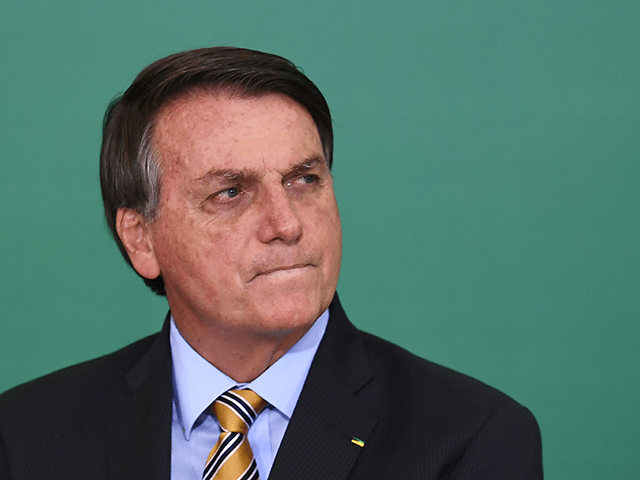Brazilian President Jair Bolsonaro told fellow heads of state at the BRICS summit on Tuesday that the World Health Organization (W.H.O.) “urgently needs reforms” and that its “supposed monopoly on knowledge” hurt the fight against the Chinese coronavirus.
BRICS is a trade bloc consisting of the world’s largest “developing” nations: Brazil, Russia, India, China, and South Africa. China is the world’s second-largest economy and the world’s worst carbon-emitter but continues to insist before the world that it is a “developing,” not fully “developed,” nation. BRICS was founded a decade ago when the leaders of the countries involved were more ideologically aligned but has struggled in the face of the election of the conservative Bolsonaro and the growing economy and military rivalry between India and China under Prime Minister Narendra Modi. Russia and China have also experienced growing tensions related to China’s attempts to increase its military footprint in the Middle East through its permanent military base in Djibouti, across the sea from Yemen.
This year, BRICS heads of state held a “virtual” summit in which they delivered their remarks online from their home states. Bolsonaro used his time to speak to call for the BRICS states to no longer emphasize multilateralism or uphold international institutions for their own sake, but rather unite to reform them into functional mechanisms to solve problems.
Bolsonaro has been one of the world’s most vocal opponents of using authoritarian lockdowns to prevent the spread of the Chinese coronavirus, warning that their devastating economic impact could compound the harm caused by the pandemic itself.
“From the beginning, I also criticized the politicization of the virus and the supposed monopoly of knowledge on the part of the W.H.O., the World Health Organization, which urgently needs reforms,” Bolsonaro told the summit. “It is necessary to emphasize that the crisis demonstrated the critical nature of nations as a solution to the problems the world is currently facing.”
“We have to recognize the reality that it wasn’t the international organizations that overcame the challenges, but the coordination between countries,” Bolsonaro continued. “In Brazil, it was our national institutions and dedicated professionals in the medical, nursing, and pharmaceutical areas that responded to the challenges and fought the virus.”
“To have a truly integrated and active international community, we need to reform international entities, for example the OMS and the WTO [World Trade Organization],” Bolsonaro affirmed. “WTO reform is fundamental for the restoration of global economic growth.”
Bolsonaro also demanded reforms at the United Nations Security Council, noting that the three BRICS nations that do not have permanent seats there – Brazil, India, and South Africa – are advocating for such a position.
He concluded by stating that “national sovereignty” was key to economic growth and the path out of the pandemic was “an international system based on freedom, transparency, and security.”
While noting that delicate handling of national economies is as important as careful responses to the pandemic, Bolsonaro did not offer any specific criticism of lockdown measures as he has in the past. Last month, Bolsonaro said of other nations freezing their economies, “I don’t understand it,” noting that skyrocketing poverty triggered by the forced closures of businesses does not help pandemic response.
Bolsonaro also claimed to be in full agreement with BRICS about vaccine response to the outbreak without addressing the campaign he has launched against vaccines made in China in his country. Bolsonaro has repeatedly stated that he will not allow state governors to mandate experimental vaccine candidates against coronavirus and personally intervened to prevent Sao Paulo Governor Joao Doria from importing thousands of doses of one of China’s vaccine candidates.
The W.H.O. has faced severe criticism for its poor handling of the Chinese coronavirus pandemic, from its praise of the Chinese Communist Party’s secretive behavior regarding the origin of the virus to publishing false information regarding the outbreak. In January, the W.H.O.’s official page on Twitter claimed that “no clear evidence” existed that the highly contagious Chinese coronavirus could be transmitted from human to human.
The government of Taiwan, which cannot join W.H.O. as a member due to pressure from China, criticized the organization following these claims, noting that Taiwanese officials had warned the W.H.O. in December of an emerging respiratory disease outbreak and that patients in Taiwan had been placed in isolation, suggesting person-to-person transmission. The German newspaper Der Spiegel subsequently published a report stating that Chinese dictator Xi Jinping had urged W.H.O. director-general Tedros Adhanom Ghebreyesus to withhold from the public the contagious nature of the virus, a report both Chinese officials and the W.H.O. denied.
A subsequent report from the Associated Press revealed that W.H.O. officials publicly praised China’s response to the outbreak while privately criticizing it and expressing concerns that any public criticism would result in the Communist Party persecuting key scientists and doctors working on containing the outbreak. The Communist Party condemned the remarks by W.H.O. officials as “seriously inconsistent with facts” following their publication.
The W.H.O. is currently fighting an outbreak at its offices in Geneva, Switzerland. At least 65 staffers at the United Nations entity have tested positive for the virus.

COMMENTS
Please let us know if you're having issues with commenting.